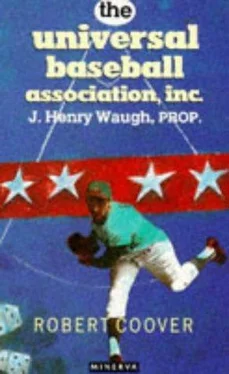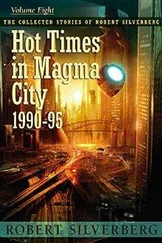He wondered what Flynn was going to do now. Probably ought to get rid of Casey. Otherwise, the whole damn team was in for it. Besides, Casey probably wouldn't be much good now anyhow. "Killer," they were already calling him. But Rooney knew Sycamore Flynn well enough to know he'd never do what was smart. Hell, he'd probably even start feeling sorry for that young sonuvabitch.
They pulled in. Through the window as they unloaded, he could see that Lew and Fanny Lydell had come to meet the train; darkly wrapped, somber faces, pious tilt to their heads, carrying umbrellas. Long Lew was even beginning to look like his father-in-law — silly bastard was forgetting bis own immortality, wanted to be Chancellor instead. Fanny McCaffree was her daddy's girl, all right. Hadn't plumped out at all. Must be pushing fifty, and she still had that long stringy spinsterish frame she had back in XLIII when Long Lew split it for her in the Knick dugout to win a bet with Jaybird "Wall. Her butt hadn't even spread much, for all the action. Not a peep out of her that day, no thrashing about, just an imbecile loll of her head off the players' bench, eyes bulging on that birdy face, and something like a soft gurgle in her long white throat. They had all laughed to watch it rip. The Knicks really packed them in for a while after that, and there were always clusters of the curious nosing around the dugout after games, hoping for a rerun. If Rooney'd had any daughters or even a wife, he would have tried to work up something like it in the Haymakers' ball park. No imitators of that boy, though. Long Lew humbled them all. Now, in an unflattering droop, he extended his hand and said: "We're glad you've come."
"Henry!" cried Lou. "Gee, I been looking for you! I just come from your place, it was all dark and I thought — Henry, is there something. .? I mean, Mr. Zifferblatt nearly— what's the matter, Henry?"
"I'd like to listen to some music, Lou. Would you mind?"
"Music! Well, no, but — Henry! why, what's — you look awful!"
"Nothing. A… a death. I—"
"Oh!" Lou's round weight sagged softly. He stared at the white flower. "I'm… I'm sorry, Henry. Who…?"
"I don't feel like talking about it, Lou. I just thought, well, I dropped by, I thought maybe some music might…"
"Why, sure , Henry!" Lou squeaked, truly concerned. He fumbled in the bulge of his coat, panting lightly, came up with the keys, dropped them, stooped for them with a tender grunt, tried three or four in the lock before he found the right one. "Mr. Zifferblatt was in a, not a very good mood, but I explained something was wrong, that it was just, you know, seemed like something was on your mind, and — it'll be all right, Henry, you'll see, he's not inhuman, he'll—" They went in.
Dark vaults. Shhh. Musty Gothic odors. Candles. The transepts ablaze with innumerable waxlights. That's it. Stop fighting it. You loved him. You don't have to be ashamed about that. Let the ballplayers come in now. Let them fill the cathedral. Pioneers, regulars and old veterans alike, the first to enter, to pass by—
Lights: Lou switched on the overhead, bringing muss and clutter to view. Not a disorder so much as a clumsy order, everything bumped out of place, but its proper place still plainly evident. Henry closed his eyes against it, sought the dark and higher spaces.
"I'm sorry, things are kind of a mess," Lou said, his welcome ritual. "Can… can I take your hat, Henry?"
Henry looked up at his friend. Moonface abloom with pity. Wrong emotions. One day, he realized, they would grow apart. He gave Lou his hat. Lou plodded with it and his own hat to the middle of the room, hesitated, seemed not to know what to do with them. "Do you mind?" Henry asked, reaching for the switch of a floor lamp nearby. Get that damn overhead off.
"No!" cried Lou, then clambered anxiously forward, hat in each hand, to help: with Henry's he batted the shade askew. "I'm all thumbs," he complained, putting Henry's hat on his own head and reaching forward again. Henry backed away, but almost miraculously, the light came on and the shade was righted. Lou turned toward him, grinning sheepishly under the hat two sizes too small for him. Henry switched off the overhead.
While Lou wandered absently around the room with the hats, Henry turned to the shelves, thumbed thoughtfully through the recordings. Have to be careful, no woeful threnodes, he cautioned himself broadly, no cheap sentiment. It was welling up in him; he needed something with precision, discipline, control. Like the kid himself. Harmonious, though. Nothing cacaphonic. Just damp cool concrete, a floor — his eye fell on the Archduke . The aristocrat. Third movement: bottom of the third. McCaffree wanted a full orchestra, something not just for the boy but for the whole Association, but no, Bancroft had his way. It was right. He put it on.
"Can I fix you something, a drink, coffee, pop..?" Lou had rid himself of the hats, but wore his coat still.
"No — well, some sherry maybe," Henry said. "If it's not too much trouble."
"No trouble!" Lou assured him, ricocheting kitchenward off a table and an easy chair, in that heedless spongy way of his.
Throughout the room, equipment hummed. Henry settled back in a rocker, waited, eyes closed, for the piano's first soft footfalls. And they entered in. The somber throng, the Chancellor and his people, friends and foes, but foes none to the spirit this boy had shown them, the majesty in the mere sweep of a pitching arm, the fulfillment in the mere acceptance of a catcher's signal. Magic, yes, yes it was, had been. Resonant strings filled the air with their solemn dialogue, violin speaking of brilliance and sensitivity, cello of maturity and might. The daily upward struggle and the underlying continuity of the — or did they really say so much, Bancroft wondered. No, no — they said nothing, they simply. . simply were true.
Henry sipped the sherry: the moist remnant of passage, sponged from the walls of sepulchres. He smiled gently at that, watching Barney Bancroft, chin in hand, suffer mutely in the cathedral's hollow gloom. Brother to the father, Barney was a father to the son. And beautiful, yes, he was a beautiful ballplayer. Was. Murdered by the past tense and laid in a lonesome grave, the black pit of history: he was. Was beautiful. Take it easy, Barney. Just love. Forget the rest.
Tick tock tick tock: high percussive pips beat the thin truth off the stained-glass windows, while far below, the strings held long painful plaintive chords, as though trying to hold time itself back. But is it enough, Barney? McCaffree wanted to know. "This is more than one man's funeral." The piano said: "It is done." Descending. "Yes, well, you mean the Requiem , I suppose." McCaffree nodded. The violin objected, rose in protest against the injustice of it, but saw at last it was futile and accepted. The cello, humbly, agreed. "All right," said Barney. In the cathredral: "Amen." Lou put on the Requiem .
"Did he leave any… family?"
A son? Yes, he could have, he could have at that, and his name…? "No. Only a father. And a brother." And how did Brock Jr. take it, what was on his mind?
"Henry! Is it your, your…?"
Henry hesitated. The question had taken him by surprise. "No," he said finally, "not exactly."
Their urgent appeal for mercy crashed suddenly in his ears, on all sides of him, the agonized pulsing of hearts clamoring for union with his own, reaching — ahh shee- it now! muttered a familiar voice in the back pew, and Henry grinned sheepishly. He saw by Lou's face it had all been misunderstood.
"A… a child then?"
"Nineteen, twenty."
"Ah!" Lou shook his head, stared down at his feet. He was out of the coat now: it lay heaped on the table like a body. "That's awful, Henry!"
Читать дальше












